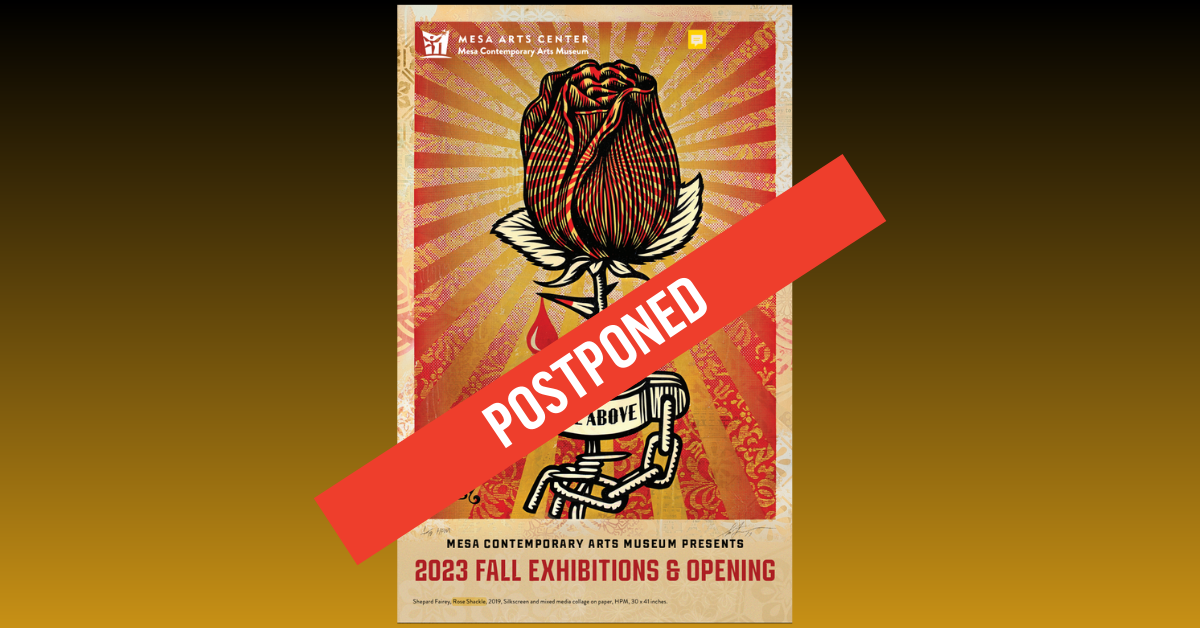NEW YORK – In a joint letter, the National Coalition Against Censorship’s (NCAC) Arts and Culture Advocacy Program (ACAP) and the ACLU of Arizona demand that officials in Mesa, Arizona, allow the opening of an art exhibit, Facing the Giant: Three Decades of Dissent, which includes a controversial work, My Florist is a Dick, by renowned artist Shepard Fairey. City officials postponed the show—along with the entire exhibition season—when requests to censor the artwork critical of police brutality were met with resistance. The joint letter calls on the City of Mesa to uphold free expression and refrain from postponing the exhibition season scheduled to begin at the Mesa Arts Center in September.
Facing the Giant: Three Decades of Dissent, a traveling exhibition of work by the celebrated street artist and activist Shepard Fairey, was scheduled for display at the Mesa Arts Center from September 8, 2023 – January 21, 2024. In an agit-prop style typical of the artist, the exhibition features silk-screened posters espousing views critical of the military-industrial complex, government corruption, and police brutality while celebrating themes of grassroots resistance, racial equality, and immigrants’ rights.
In late July, however, staff at the Mesa Arts Center received requests to remove one particular work from the show. The poster in question, My Florist is a Dick, depicts a skeletal police officer in riot gear holding a large flower. City representatives stated they didn’t want to offend municipal police officers. Fairey is known for his politically provocative work, his iconic HOPE poster featuring Barack Obama, and for founding OBEY Clothing.
“By prohibiting the display of artwork that may critique government policies, actions, or agencies, the City of Mesa risks turning its Arts Center into a propaganda center rather than a forum for artist-driven expression and ideas,” said Elizabeth Larison, Director of the Arts and Culture Advocacy Program, NCAC. “We strongly encourage the City of Mesa to embrace free expression and allow the community to have an opportunity to view the exhibit.”
“The government may not censor artwork because it disagrees with or is offended by the message or content of the artwork,” said Jared Keenan, Legal Director, ACLU of Arizona. “When the government censors art in this way, it undermines one of the primary purposes of art, which is to evoke an emotional response from the audience.”
The National Coalition Against Censorship’s (NCAC) Arts and Culture Advocacy Program advocates for the right of artists to participate in the democratic dialogue by defending public access to their work and supporting their ability to express views that may be unpopular or controversial freely.
About National Coalition Against Censorship
Since its inception in 1974, the National Coalition Against Censorship (NCAC) has been a first responder in protecting freedom of expression, a fundamental human right, and a keystone of democracy. Representing 59 national education, publishing, and arts organizations, NCAC works with people fighting censorship at the local level. It encourages and facilitates dialogue between diverse voices and perspectives, including those historically silenced.
About the ACLU of Arizona
The ACLU of Arizona advances equity and dismantles systemic injustice by taking legal action, influencing policy, and mobilizing our communities to protect all Arizonans’ civil rights, liberties, and dignity. The ACLU’s core mission includes protecting the right to free expression as guaranteed by the First Amendment to the U.S. Constitution and Article II, section 5 of the Arizona Constitution.
—
Read NCAC’s full letter to Mesa officials here:


